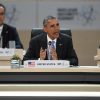
In the presidential primaries in the US, volley after volley has been fired against the opening up of American trade, albeit with nuances and more than a few provisos. Donald Trump proposes a 45% tariff on Chinese imports. Hillary Clinton, despite expressing previous support, now harbours serious doubts about the TPP, the trade and investment agreement between 12 Pacific-Rim countries. Bernie Sanders is also little enamoured of greater deregulation, and even lambastes his Democrat opponent for having supported the NAFTA deal with Canada and Mexico in 1992. And this comes at a time when the country is going through a period of reindustrialisation, albeit of a new type (with automation and a rise in labour costs in China and other Asian countries resulting in work being brought back to American shores). The same climate is evident in Europe too, where opposition to the TTIP (Transatlantic Trade and Investment Partnership) has grown from both the left and the far right. Europe is also the place where, under pressure from their farming lobbies, a group of 13 countries led by France is hindering a deal between the EU and Mercosur that has taken years to get as far as it has.
In its latest World Economic Outlook the International Monetary Fund warns about the threat of a “synchronised slowdown” and a political backlash against globalisation. Its data indicate that, while it continues growing, worldwide trade in goods and services is slowing down. This is due in part, as other studies report, to the fact that China is importing less.
Does this entail that globalisation has peaked? Globalisation meant that international trade grew at a faster rate than GDP. And yet the Great Recession that began in 2008-09 has caused a slump in trade from which the world has still not recovered; this despite the fact that, unlike the post-1929 period, there was no resorting to the protectionism that is now starting to emerge. A study carried out by the Bruegel think tank asks if it is a cyclical change, due to fragile European recovery and slower growth in China, or structural, linked to a change in global value chains that would thus bring about stagnation in the future. It concludes that over the long term the growth in global exports, and its components, should revert to equilibrium with GDP growth. But if the latter does not grow, neither will the former.
The statistics used to measure the digital economy may be misleading, as Charles Bean suggests in a study commissioned by the Bank of England. We could be in a new phase of globalisation. A report from the McKinsey Global Institute, Digital Globalization: The New Era of Global Flows, sets out from the premise that the world is more connected than ever, and although the world trade in goods has flattened out ‘for the first time in history, emerging economies are counterparts on more than half of global trade flows, and South-South trade is the fastest-growing type of connection’. To which it adds that ‘cross-border data flows are surging’. It points out that millions of small and medium-sized businesses throughout the world have become exporting ‘micro-multinationals’, by using such e-commerce platforms as Amazon, Alibaba, eBay and others. The study reports that 12% of the global goods trade is conducted via international e-commerce.
The McKinsey Global Institute Connectedness Index shows how countries participate in inflows and outflows of goods, services, finance, people and data. Singapore leads the ranking, followed by the Netherlands, the US and Germany. China has risen from 25th in the list to seventh, while Spain occupies a respectable 15th place.
Are the Le Pens, Trumps and even Clintons of this world living on another planet? The fact is that despite the TPP, and the fraught negotiations surrounding the TTIP, the omens are not good for wide-ranging international trade deals. The World Trade Organisation has buried the Doha Round, in another example of inductive global governance. Similarly, Lawrence Summers, former US Treasury Secretary, argues that world trade should be driven from the bottom up, because many people perceive it as ‘a project carried out by elites for elites’, and that a ‘revolt against global integration’ is currently taking place in the West. He calls for a shift from international trade agreements to international harmonisation agreements that would give precedence to issues such as labour rights and environmental protection. But lying in wait for such deals –even more so than tariffs, although for farmers these are chiefly responsible for slowing down the EU’s negotiations with Mercosur and Japan– are precisely the major stumbling blocks the trade negotiations of this new era have run up against. In any event, Trump, Clinton, Le Pen and others are a reflection of their electorates. In other words, the pressure is also to some extent ‘bottom-up’. Although if Hillary Clinton gets elected, she will end up pushing for ratification of the TPP, albeit with a certain degree of caution.


